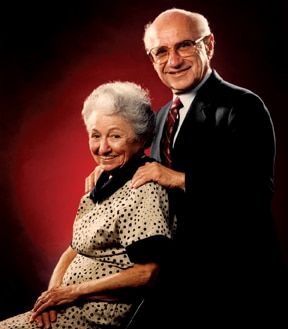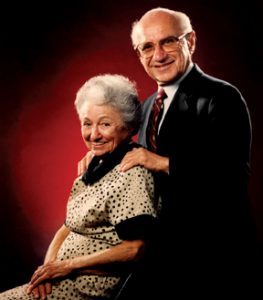Rose Friedman made me a feminist.
As a 20-year-old undergraduate student, I attended an academic talk that was also attended by the famous economist and her much more famous collaborator and husband, Nobel Prize winner Milton Friedman. The Friedmans were in their eighties and more than a decade past the years when their PBS series “Free to Choose” popularized libertarian economics and made them Reagan-era heroes.
Milton and Rose Friedman and a roomful of academics, graduate students, and myself were there to hear a speech by conservative Harvard political scientist Harvey Mansfield. At that time, Mansfield was writing and speaking widely on the early 20th century ideal of “manliness” and its political significance. Among other things, he lamented what he perceived as a lack of “manliness” in contemporary politics.
I did not find this particularly troubling; after all, as a Mormon female, I had been taught all my life to emulate the qualities of male role models in my spiritual life, and the political world of my home state of Utah was heavily male-dominated. My well-connected, staunch Republican grandfather stoked my interest in politics and never let me feel that my gender was a liability. In fact, I quickly learned that I could use my status as a pretty young woman to influence men with power and obtain certain advantages, like an invitation to an exclusive event like the one I was attending.
At the end of Mansfield’s talk, he opened the floor for questions. I raised my hand and innocently asked him the question that had been on my mind all evening: whether I, as a female, should strive to be more politically “manly” or if there was a corresponding “womanliness” that I should aspire to. I must have inadvertently touched a nerve, because the venom that spewed forth in response to my question absolutely shocked me. I shrank into my chair under the onslaught of his words and the disapproving looks of those around me, aghast that I had asked the great professor Harvey Mansfield a question that he perceived as a challenge.
Then, on the front row, tiny Rose Friedman stood up. All four-and-a-half feet of her, looming like a giant in my memory. Dr. Friedman shook her finger at the speaker and uttered her only public words that day. “Harvey, this young woman has asked you an excellent question, and you haven’t answered it!”
In that moment, I learned several important things. I learned that my gender was, in fact, a liability. I learned that some great men are horrid human beings. But most importantly, I learned how powerful and transformative it can be when women stand up for other women.
I left that day with the sure knowledge that contemporary politics did not need more “manliness.” It needed more Rose Friedmans.
Looking back from the perspective of years, I don’t know if Rose Friedman would be pleased or appalled that her brief influence helped turn a naive Utah Mormon girl into a committed intersectional feminist Mormon woman. I don’t know how she felt as a scholar living in the perpetual shadow of her husband, or whether her conservative views on economics influenced her views on social issues. I do know that at a key moment in my life she made me feel like my voice was important and worth hearing, and for that I honor her.
* * *
Who are the Rose Friedmans in your life? What kinds of experiences have influenced your sense of justice, your view of the world, and your political participation? How have your beliefs and priorities changed over time? How do you decide when and how to stand and make your voice heard amidst a cacophony of contrary opinions?
For our Summer 2020 issue, Exponent II Magazine is returning to its roots, and we are asking you to share your stories. The original 19th century Woman’s Exponent is full of content by and about Mormon women who were active in the political debates of the day, advocating for change, and contributing to public discourse in a myriad of ways. We would like to know how YOU are following in the footsteps of our spiritual foremothers today by engaging in the public sphere and shaping your community. We particularly welcome contributions from women with historically-marginalized identities or who come from outside the United States. First-time writers are also encouraged. Whatever your background, affiliation, and life experiences, we think your voice is important and worth hearing.
Submissions should be in Word or Google Doc form and between 700-2400 words. Send submissions to exponentiihttps://exponentii.org/wp-content/uploads/2021/12/IMG_5173-scaled-2.jpg AT gmail DOT com by April 1, 2020. Submissions should reflect the mission of Exponent II.
E.Gray lives in an old New England farmhouse with her husband, two kids, and a dog. She teaches European History to college students and Primary to seven-year-olds, dabbles in small-town politics, and serves as co-Managing Editor of Exponent II Magazine.




